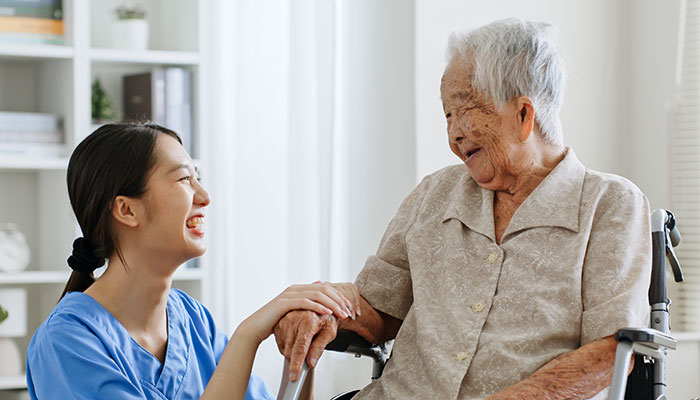Athens Care Advocate
A guide for family caregivers
December 2023/January 2024
Traveling with a person with dementia can be daunting. But there are ways to reduce the chance of a meltdown in the airport and make it a smooth and enjoyable trip. Are you in the market for a senior tablet for your loved one? In our middle article we look at features to consider so you can be sure your investment is a good match to your loved one’s abilities. Last, we look at ways to improve the care your relative receives from the staff in the hospital, rehab, or in an assisted living community.
Contact Us
Dementia: Navigating the airport
 As exciting as a trip can be, for a person with dementia, the loss of routine is confusing. And the loud, large, busy terminal spaces are often distressing.
As exciting as a trip can be, for a person with dementia, the loss of routine is confusing. And the loud, large, busy terminal spaces are often distressing.
Too much stimuli!
Your job is to keep the process as calm and unhurried as possible. If you are rushing, flustered, and anxious, your loved one with dementia will mirror that anxiety and become agitated, too. Preplanning and ample use of airport support programs will make your job a lot easier.
Here are things you can do at the airport to make for a good travel day.
- Dress in layers. Being too hot or too cold can result in agitation.
- Arrive two hours early. Arrive with time to spare so you won’t be concerned about possibly missing the plane if a mishap occurs (a bathroom accident, an outburst in security…). With spaciousness of time, you can deal with things calmly as much as possible, the way you would if you were home.
- Check your luggage. You want your hands free to help your family member. Bring a day bag as your carry-on. For your relative, include a comfort object, favorite treats, and possibly a headset and DVD or CD player.
- Ask for wheelchair assistance. Ideally, arrange this with the airline when you purchase the tickets. But if you didn’t, check in at the counter and make the request. Even if your loved one is able bodied, it helps to have them seated (less likelihood of wandering off!). The airline staff will prove an immense help going through security, but it’s equally helpful to have their assistance when you land and deplane. Getting to baggage claim is often a long walk, with crowds bumping and jostling.
- Ask about family bathrooms. The wheelchair attendant can point them out.
- After security, attend to bodily needs. This is a great time to get some food, use the facilities, and find a quiet place to wait. A lounge is great if you have access.
- Request preboarding. Check in at the gate and ask to board with the earliest group.
The Sunflower Program. This program provides a cheery sunflower on a neck lanyard for those with a “hidden disability.” It discreetly signals airport personnel that your loved one has a disability. The Sunflower Program provides a list of participating airports.
Return to topChoosing a "senior tablet"
Much of life’s interactions occurs online these days. If your loved one is not tech savvy, has mild dementia, or has little access to support in a facility, you might consider a “senior tablet.” They have limitations compared to the typical consumer tablet, but could well be worth it. They are streamlined and simplified so your loved one can reap the benefits of safe access to the many options for online connection.
Consider these questions before you buy:
- How user friendly is it? Will its features reduce the number of calls to tech support? Many “it’s broken!” calls occur simply because the tablet battery ran down. Is wireless charging a feature? Similarly, how easy is it to stay connected? A Wi-Fi-only option is cheaper but may require rebooting. A cellular connection is more reliable but involves a monthly fee.
- How limiting are safety features? You may want to restrict incoming and outgoing communications to those on your relative’s contacts list. Or not. What about browsing freedom? Do you want to allow access to only selected websites?
- How good is video calling? Most senior tablets feature some simplified form of Zoom or FaceTime. Some allow only one-on-one calls. Others accommodate group calls. Check the sound quality: Good enough for your relative’s hearing?
- Can other apps be added? After video calls, photo sharing is the next most popular activity. Does the senior tablet allow for photo sharing apps? Music apps, podcasts, or audio books? E-books or digital newspapers? Looking up the weather? Creating and receiving reminders? Watching videos? If your relative can’t download apps themself, can you do so remotely?
- Who provides tech support and how? Is there remote support with a video conferencing app already installed? Or just phone calls or email? Can the support team take over the screen and make needed adjustments? Can you (and would you want to)?
Positive connections with staff
Your loved one’s daily experience in a hospital, rehab, or assisted living community—even at home with paid home help—greatly depends on the aides who care for them. You can help ensure a good experience by building a positive relationship with those staff so they are inclined to go the extra mile, even on a bad day (theirs or your loved one’s).
- Introduce yourself. Share your name and a bit about yourself. How far away you live. If you are the one with the two granddaughters. How often you plan to visit.
- Ask about them. Nursing assistants are commonly unappreciated. Memorize their names. Get them talking about their lives, their children, their work. Come at different times of the day so you meet the caregivers on each shift.
- Showcase your loved one’s history. Bring labeled photos of family or of your loved one in their professional or volunteer life. This will pique curiosity and encourage staff to know your relative as more than the “hip replacement in room 210.”
- Share special occasions. Is it your mom’s birthday? Bring enough cake for the staff. Is it a holiday? Swap stories and share treats with the team.
- Contribute your talents. Do you play the ukulele? Have extra jigsaw puzzles? Periodically bring something that can lighten the day for your family member, the staff, and maybe even other residents.
- Leave special instructions in writing. If you have a special request, talk with the supervisor AND leave a note in a place all will see. There is a labor shortage and staff may be rushed or new. Don’t assume your request will be passed from one employee to the next.
- Be generous with compliments. Your ability to acknowledge the positive lends more credibility if you should ever need to ask for changes or lodge a complaint.

